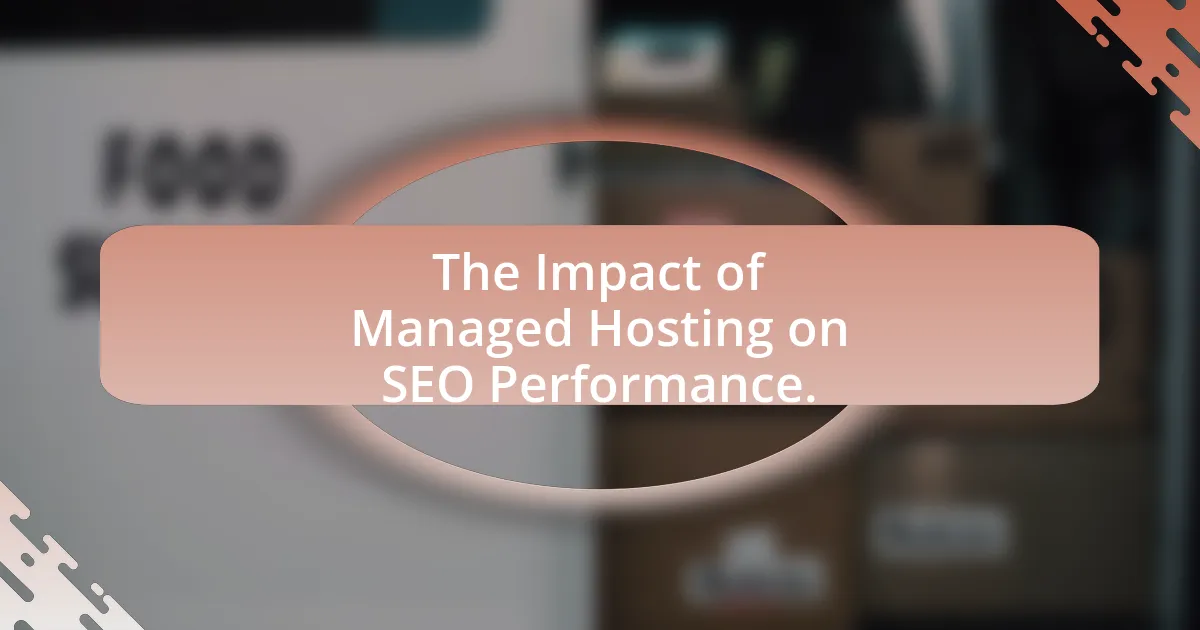Managed hosting significantly influences SEO performance by enhancing website speed, reliability, and security. Key factors include improved loading times through optimized server configurations, high uptime rates that ensure consistent accessibility, and robust security measures that protect against vulnerabilities. The article explores how server location affects SEO rankings, the importance of SSL certificates, and the implications of DDoS protection on performance. Additionally, it discusses the relationship between traffic spikes and organic growth, the potential drawbacks of managed hosting, and best practices for maximizing SEO outcomes through ongoing maintenance and performance audits.

What is the Impact of Managed Hosting on SEO Performance?
Managed hosting positively impacts SEO performance by providing enhanced website speed, reliability, and security. Faster loading times, which are crucial for user experience and search engine rankings, are often achieved through optimized server configurations and dedicated resources in managed hosting environments. Additionally, managed hosting services typically include regular updates and security measures that protect against vulnerabilities, further ensuring that websites maintain their rankings and avoid penalties from search engines. According to Google, page speed is a ranking factor, and sites that load quickly tend to have lower bounce rates and higher engagement, which can lead to improved SEO outcomes.
How does managed hosting influence website speed and performance?
Managed hosting significantly enhances website speed and performance by providing dedicated resources and optimized server configurations. This type of hosting typically includes features such as SSD storage, advanced caching mechanisms, and content delivery networks (CDNs), which collectively reduce load times. For instance, a study by Google found that a one-second delay in page load time can lead to a 20% decrease in conversions, highlighting the critical role of speed in user experience and SEO. Additionally, managed hosting often includes proactive monitoring and maintenance, ensuring that any performance issues are quickly addressed, further contributing to consistent website performance.
What role does server location play in SEO rankings?
Server location significantly influences SEO rankings by affecting website loading speed and regional relevance. Search engines prioritize fast-loading websites, and a server located closer to the target audience typically results in quicker load times. For instance, Google has indicated that page speed is a ranking factor, and studies show that a one-second delay in loading time can lead to a 7% reduction in conversions. Additionally, having a server in the same country as the target audience can enhance local SEO, as search engines often consider server location when determining the relevance of content for local searches. Therefore, the strategic placement of servers can directly impact both user experience and search engine visibility.
How does uptime affect search engine visibility?
Uptime directly affects search engine visibility by influencing a website’s ranking in search engine results. Search engines prioritize websites that are consistently accessible; therefore, high uptime rates lead to better rankings. For instance, Google has indicated that site reliability, including uptime, is a ranking factor, as it enhances user experience and reduces bounce rates. Websites with frequent downtime may experience decreased crawl frequency by search engine bots, resulting in lower visibility and potential loss of organic traffic.
What are the security benefits of managed hosting for SEO?
Managed hosting provides enhanced security benefits for SEO by ensuring that websites are protected against cyber threats, which can negatively impact search engine rankings. With managed hosting, providers typically offer features such as regular security updates, firewalls, and intrusion detection systems that safeguard against data breaches and malware attacks. These security measures help maintain website uptime and performance, both of which are critical factors for SEO. For instance, Google considers site security as a ranking factor, and websites that are frequently compromised may experience lower rankings. Therefore, the robust security protocols inherent in managed hosting contribute to a more stable and trustworthy online presence, ultimately supporting better SEO outcomes.
How do SSL certificates impact SEO rankings?
SSL certificates positively impact SEO rankings by enhancing website security, which is a ranking factor for search engines like Google. Websites with SSL certificates are perceived as more trustworthy, leading to improved user experience and lower bounce rates. Google confirmed in 2014 that HTTPS is a ranking signal, meaning that secure sites may rank higher than their non-secure counterparts. Additionally, as of July 2018, Chrome began marking HTTP sites as “Not Secure,” further incentivizing the use of SSL certificates for better SEO performance.
What are the implications of DDoS protection on website performance?
DDoS protection can negatively impact website performance by introducing latency and reducing speed due to the additional security layers. When a website implements DDoS protection, it often routes traffic through security filters that analyze incoming requests, which can delay legitimate user access. Research indicates that while DDoS protection is essential for maintaining uptime and security, it can lead to increased load times, with studies showing that even a 100-millisecond delay can reduce conversion rates by 7%. Therefore, while DDoS protection is crucial for safeguarding against attacks, it can compromise the overall performance of a website, affecting user experience and potentially impacting SEO rankings.
How does managed hosting affect website scalability and SEO?
Managed hosting significantly enhances website scalability and SEO performance by providing dedicated resources and optimized server configurations. This type of hosting allows websites to handle increased traffic seamlessly, as managed hosting providers often offer scalable solutions that can adjust resources based on demand. For instance, a study by HostingAdvice found that websites on managed hosting platforms experienced up to 50% faster load times, which directly correlates with improved SEO rankings, as search engines prioritize fast-loading sites. Additionally, managed hosting typically includes advanced security features and regular updates, which further contribute to better SEO by reducing downtime and maintaining site integrity.
What is the relationship between traffic spikes and SEO performance?
Traffic spikes can significantly enhance SEO performance by indicating increased user engagement and interest in content. When a website experiences a surge in traffic, search engines often interpret this as a signal of relevance and authority, which can lead to improved rankings in search results. For instance, a study by Moz found that websites with higher traffic levels tend to rank better due to increased click-through rates and user interactions, which are key factors in SEO algorithms. Therefore, the relationship between traffic spikes and SEO performance is directly correlated, as spikes can lead to better visibility and higher rankings in search engine results.
How can managed hosting support growth in organic traffic?
Managed hosting can support growth in organic traffic by providing enhanced website performance, which is a critical factor for search engine optimization (SEO). Faster loading times and improved uptime lead to better user experiences, reducing bounce rates and increasing the likelihood of visitors engaging with the content. According to Google, page speed is a ranking factor, meaning that websites with optimized performance are more likely to rank higher in search results. Additionally, managed hosting often includes features such as automatic backups, security enhancements, and scalability, which contribute to maintaining a stable and secure website. These factors collectively improve a site’s credibility and visibility, further driving organic traffic growth.
What are the potential drawbacks of managed hosting on SEO?
Managed hosting can negatively impact SEO due to limited server control and potential performance issues. When using managed hosting, users often have restricted access to server configurations, which can hinder optimization efforts such as caching and content delivery network (CDN) integration. Additionally, if the managed hosting provider experiences downtime or slow server response times, it can lead to increased page load times, negatively affecting user experience and search engine rankings. Research indicates that a one-second delay in page load time can result in a 7% reduction in conversions, highlighting the importance of server performance on SEO outcomes.
How can misconfigured managed hosting settings harm SEO?
Misconfigured managed hosting settings can harm SEO by causing slow website loading times, which negatively affects user experience and search engine rankings. Search engines like Google prioritize fast-loading sites; a delay of just one second can lead to a 7% reduction in conversions, according to a study by Akamai. Additionally, improper server configurations can lead to frequent downtime or errors, resulting in search engines being unable to crawl the site effectively. This can lead to lower visibility in search results, as search engines may penalize sites that are unreliable or inaccessible.
What are the risks of vendor lock-in for SEO strategies?
Vendor lock-in for SEO strategies poses significant risks, primarily limiting flexibility and adaptability. When businesses rely heavily on a single vendor for their SEO tools or services, they may face challenges in switching to alternative solutions, which can hinder their ability to respond to changing market conditions or algorithm updates. For instance, a study by Gartner indicates that 70% of companies experience difficulties in migrating away from a vendor due to proprietary technologies, which can lead to stagnation in SEO performance. Additionally, vendor lock-in can result in increased costs over time, as companies may be forced to pay higher fees for continued service without the option to negotiate or explore competitive offerings. This dependency can ultimately compromise a company’s SEO effectiveness and overall digital marketing strategy.
How can businesses choose the right managed hosting for optimal SEO performance?
Businesses can choose the right managed hosting for optimal SEO performance by evaluating key factors such as server speed, uptime reliability, and scalability. Server speed directly affects page load times, which is a critical ranking factor for search engines; for instance, Google has indicated that faster loading sites provide a better user experience and are favored in search rankings. Uptime reliability is essential, as consistent availability ensures that websites remain accessible to users and search engine crawlers, with a target uptime of 99.9% being ideal. Scalability allows businesses to accommodate traffic spikes without compromising performance, which is vital for maintaining SEO rankings during peak periods. By focusing on these factors, businesses can select a managed hosting provider that enhances their SEO efforts effectively.
What features should be prioritized in a managed hosting provider?
A managed hosting provider should prioritize features such as high uptime guarantees, robust security measures, scalable resources, and expert technical support. High uptime guarantees, typically above 99.9%, ensure that websites remain accessible, which is crucial for SEO performance as downtime can negatively impact search rankings. Robust security measures, including firewalls and DDoS protection, safeguard against threats that could compromise site integrity and user trust, both of which are important for SEO. Scalable resources allow businesses to adjust their hosting capabilities in response to traffic fluctuations, ensuring optimal performance during peak times, which can enhance user experience and SEO rankings. Lastly, expert technical support provides immediate assistance for any issues, minimizing downtime and maintaining site performance, which is essential for maintaining good SEO health.
How can businesses assess the SEO capabilities of a managed hosting service?
Businesses can assess the SEO capabilities of a managed hosting service by evaluating its server performance, uptime reliability, and support for SEO-friendly features. High server performance, indicated by fast loading times and low latency, directly impacts search engine rankings, as Google prioritizes user experience. Uptime reliability, ideally above 99.9%, ensures that websites remain accessible, preventing potential loss of traffic and rankings. Additionally, features such as SSL certificates, content delivery networks (CDNs), and the ability to easily implement redirects and optimize metadata are crucial for effective SEO. Research shows that websites with optimized hosting environments can achieve up to 50% faster loading times, significantly improving their SEO performance.
What best practices should be followed for maximizing SEO with managed hosting?
To maximize SEO with managed hosting, prioritize fast loading speeds, reliable uptime, and optimized server configurations. Fast loading speeds enhance user experience and are a ranking factor for search engines; for instance, Google recommends a loading time of under three seconds. Reliable uptime ensures that your website is accessible, which is crucial for maintaining search engine rankings; studies show that even a few minutes of downtime can negatively impact traffic and rankings. Optimized server configurations, such as using Content Delivery Networks (CDNs) and enabling HTTP/2, can further improve site performance and SEO. These practices collectively contribute to better search visibility and user engagement.
How can regular performance audits enhance SEO outcomes?
Regular performance audits enhance SEO outcomes by identifying and addressing technical issues that can hinder website visibility and user experience. These audits evaluate factors such as site speed, mobile responsiveness, and broken links, which are critical for search engine rankings. For instance, Google has confirmed that page speed is a ranking factor, and a study by Google found that a one-second delay in mobile load times can lead to a 20% drop in conversion rates. By regularly conducting performance audits, businesses can ensure their websites are optimized for search engines and users alike, ultimately improving their SEO performance.
What ongoing maintenance is necessary for SEO success with managed hosting?
Ongoing maintenance necessary for SEO success with managed hosting includes regular updates to software, monitoring website performance, and ensuring optimal server configurations. Regular software updates, including content management systems and plugins, help prevent security vulnerabilities that can negatively impact SEO rankings. Monitoring website performance involves checking load times and uptime, as search engines prioritize fast-loading sites; for instance, Google considers page speed a ranking factor. Additionally, maintaining optimal server configurations, such as using HTTPS and optimizing server response times, contributes to better user experience and improved search engine visibility. These practices collectively enhance the site’s SEO performance and ensure it remains competitive in search rankings.


